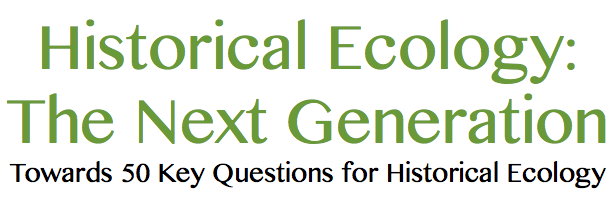Survey: 50 Key Questions for Historical Ecology

Announcing the launch of a survey asking you what are priority issues/key questions for Historical Ecology?
The goal is to crowd-source questions from individuals at any stage in their academic career to gain a broad and inclusive working list of questions that will be workshopped and edited down to "50 Key Questions for Historical Ecology" by graduate students at the 2nd International Historical Ecology Meeting in the Fall of 2015 at Simon Fraser University, Vancouver, Canada. We welcome you to join the discussion and submit your questions: http://svy.mk/1EiCYr1
Some example questions:
- How is biodiversity a reflection of past and ongoing human activity?
- What are the best indicators to differentiate between cultural and natural fires?
- What non-domesticated plant species are markers of human acitivity?
- Can we use species range extensions to infer human transplanting of plant species?
- How do help accomodate both traditional and modernized farming practices?
- How do we identify all of the parties interested in landscapes where biodiversity is a contested issue?
- What are the limitations of adaptation within a system?
- How do we translate research into policy?
- How do we communicate, conceptualize and integrate the temporal frames the different disciplines or research projects are concerned with?
- How do we stress that the entirey of the past is not equally accessible, while still creating educational narratives?
- Does historical ecology have to deal exclusively with the longue durée?
- How do we use technology to visualize and communicate time?
- How do we address the trepidation that some individuals, coming from diverse disciplinary backgrounds, express towards models?
- How do we address the tendency of models to conflate?
- How do we address false perceptions of what a model is?
- How can historical ecology be made relevant for education?
The survey is one of the outcomes of the 1st International Workshop on Historical Ecology: The Next Generation hosted in November 2014 in Uppsala, Sweden, sponsored by the Department of Archaeology and Ancient History at Uppsala University, and the Mind and Nature and Integrated History and future of People on Earth research network (IHOPE).
We are very pleased to announce the 2nd conference/workshop in the Fall of 2015, hosted by Simon Fraser University - Please stay tuned for dates and the call for abstracts.
Participation is open to everyone so please help spread the word and forward this to message to colleagues and other interested scholars!
Please contact Chelsey Geralda Armstrong or Anna Shoemaker for any questions.
